As many of you know, continuous learning is a critical part of DevOps. That's why we put together this list. These are only 13 books from a vast array of resources out there, sourced from the Open Source DevOps team. What books are you reading to fine tune your DevOps practice and skills? Tell us in the comments.
 Accelerate, The Science of Lean Software and DevOps: Building and Scaling High Performing Technology Organizations
Accelerate, The Science of Lean Software and DevOps: Building and Scaling High Performing Technology Organizations
by Nicole Forsgren, Jez Humble, Gene Kim (recommended by Dan Barker)
All the data from the state of DevOps reports compiled into a book.
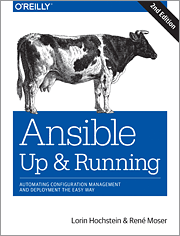 Ansible: Up and Running, Automating Configuration Management and Deployment the Easy Way
Ansible: Up and Running, Automating Configuration Management and Deployment the Easy Way
by Lorin Hochstein, Rene Moser (recommended by Daniel Oh)
In my experience, configuration management is a must in order to run and deploy modern applications and DevOps environments! Ansible is one of the best choices and it is adopted by a large community of DevOps developers and system administrators. In this book, you will learn several things about Ansible, understand how Ansible differs from other configuration management systems, use the YAML file format to write your own playbooks, learn Ansible’s support for variables and facts, work with a complete example to deploy a non-trivial application, use roles to simplify and reuse playbooks, make playbooks run faster with ssh multiplexing, pipelining, and parallelism, deploy applications to Amazon EC2 and other cloud platforms, and use Ansible to create container images and deploy containers.
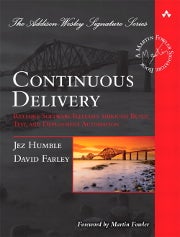 Continuous Delivery: Reliable Software Releases through Build, Test, and Deployment Automation
Continuous Delivery: Reliable Software Releases through Build, Test, and Deployment Automation
by Jez Humble and David Farley (recommended by Daniel Oh)
This book is a guide to release software faster while reducing risk and increasing quality. It enumerates the best practices and fast, simple techniques for release and production deployment management. It also includes many other practices like production monitoring and tracing, dependency management, and the effective use of virtualization.
The books will teach you the foundation of continuous delivery, the techniques to create a good deployment pipeline, and a vision about the delivery ecosystem.
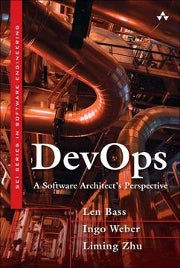 DevOps: A Software Architect’s Perspective
DevOps: A Software Architect’s Perspective
by Len Bass, Ingo Weber, Liming Zhu (recommended by Daniel Oh)
For software architects, this book is a very good reference to understand and master DevOps environments. It was written by three software architects and it covers a lot of interesting subjects like DevOps requirements, virtualization and cloud computing, operations, adapting systems to work well with DevOps practices, agile methods, and test-driven development. You will find this book helpful if you are interested in handling failure detection, upgrade planning, integrating security controls, roles and audits into DevOps, preparing a business plan for DevOps adoption, rollout, and measurement and adapting softwares to your DevOps pipeline and workflows.
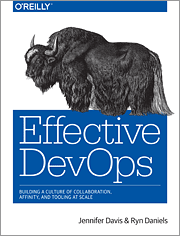 Effective DevOps: Building a Culture of Collaboration, Affinity, and Tooling at Scale
Effective DevOps: Building a Culture of Collaboration, Affinity, and Tooling at Scale
by Jennifer Davis, Ryn Daniels (recommended by Daniel Oh)
Effective DevOps is not just a technical guide but it is also a cultural and managerial guide. DevOps is about team collaboration and cultural challenges and this book focus more on these human sides. This book connects the technical and cultural aspects of DevOps in a fantastic way by describing failures and successes.
The book summarizes what DevOps actually is: "A professional and cultural movement that stresses the iterative efforts to break down information silos, monitor relationships, and repair misunderstandings that arise between teams within an organization."
 Just Culture: Balancing Safety and Accountability
Just Culture: Balancing Safety and Accountability
by Sidney Dekker (recommended by Dan Barker)
This covers blamelessness in our human systems and how to build more effective teams by creating understanding and empathy.
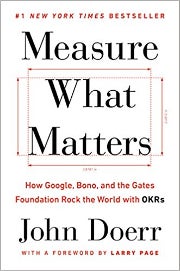 Measure What Matters
Measure What Matters
by John Doerr (recommended by Magnus Hedemark)
Measure What Matters is a book by John Doerr about a scalable methodology for leaders to set measurable goals and establish full organizational alignment. He demonstrates how it was really established first and to good effect at Intel. But he offers additional case studies in organizations from small startups to, well, Google. It's not just about alignment, though, but also establishing true enterprise agility. How do you pivot a company the size of Google to a major new initiative in a couple of weeks? It's answered here. How do you encourage an accountable culture where top-down leadership gracefully meets bottom-up? It's answered here. Much is written about DevOps from the technical and cultural perspective. I believe "Measure What Matters" and the OKR system presented therein represents key concepts in management transformation.
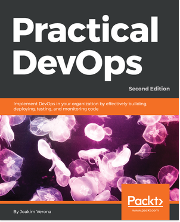 Practical DevOps
Practical DevOps
by Joakim Verona (recommended by Daniel Oh)
This book cover multiple important subjects that every DevOps engineer should know from architecture, coding, testing, deploying, monitoring, and tracking issues. What I like also about Practical DevOps is covering something that other similar books ignored which is the Internet of Things in DevOps environments.
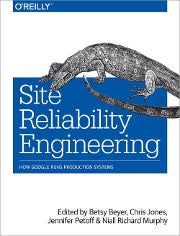 Site Reliability Engineering
Site Reliability Engineering
by Niall Murphy, Betsy Beyer, Chris Jones, Jennifer Petoff (recommended by Gordon Haff)
I view Site Reliabilty Engineering as an alternative framing for DevOps. You create effective abstractions nd platforms for developers to work on and then get out of the way. It's arguably a better model for thinking about DevOps, at least in large organiztions, than breaking down the wall between developers and operations.
 The Coaching Habit: Say Less, Ask More & Change the Way You Lead Forever
The Coaching Habit: Say Less, Ask More & Change the Way You Lead Forever
by Michael Bungay Stanier (recommended by Chris Baynham-Hughes)
This is easily one of the most effective books I’ve read in the past 12 months. Really easy to bring into your daily life, yet powerful enough to be cautious about how you use the content.
Michael breaks down seven critical coaching questions that will revolutionise the way you engage with your peers and those you currently manage (but will soon be coaching!) It doesn’t just span your working life, but I’ve found it has helped in my personal life too.
The book is really quick to read. It’s a book where every word counts and is structured brilliantly. Concise enough that I didn’t find myself thinking, “yeah, yeah, I’ve got the reason why now get to how I improve in area x” yet it gave me enough that I felt I could go out and practice with it. One would have to be blind not to see the power in what is being said and in an era where there is enough momentum to confine ‘command and control’ style leadership to the 80’s where it belongs, this book couldn’t be more timely.
Great book. Read it. Learn. Practice. Learn some more.
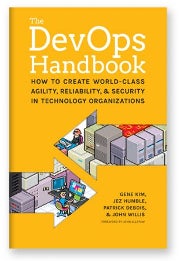 The DevOps HandBook
The DevOps HandBook
by Gene Kim, Jez Humble, John Willis, and Patrick, Debois (recommended by Daniel Oh)
This is probably one of the most known books in this selection. The DevOps Handbook is a rich guide and the fruit of years of learning. It is also one of the most influencing books in the DevOps community. If you are looking for well-researched work with historical case and business studies you need to give it a try.
This book is a reference in the DevOps world. I appreciate it and recommend it for developers, operation engineers, and IT managers!
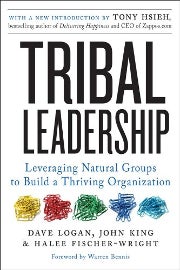 Tribal Leadership: Leveraging Natural Groups to Build a Thriving Organization
Tribal Leadership: Leveraging Natural Groups to Build a Thriving Organization
by Dave Logan, John King, & Halee Fischer-Wright (recommended by Chris Baynham-Hughes)
Essential reading for anybody interested in workplace culture or a leadership role; especially those wanting to develop open, innovative, and collaborative cultures.
The book provides an evidence based approach to developing corporate culture detailing:
- Five distinct stages of tribal culture
- Framework to develop yourself and others as tribal leaders
- Characteristics and coaching tips to ensure a practitioner can identify the levels each individual is at and nudge them to the next level
Each chapter is well structured, presenting a case study narrative before identifying coaching tips and summarising key points. I found it enjoyable to read and easy to remember.
Too often technology rather than culture is the starting point for transformation, innovation and speed to market within organisations. I’ve lost count of the times I’ve used content from this book to frame conversations around company culture and challenge leaders on what they are doing to foster innovation, loyalty and create a workplace people thrive within. The content has been a game changer for me.
The key tipping point is between levels three and four; from the ‘I’ to the ‘We’. This is our mission and Tribal Leadership forms the basis to achieving that. Check it out.
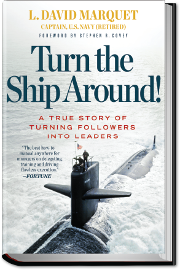 Turn the Ship Around!: A True Story of Turning Followers into Leaders
Turn the Ship Around!: A True Story of Turning Followers into Leaders
by L. David Marquet (recommended by Dan Barker)
More focused on leadership, but gives a great model for building high performing, empowered teams.
Of course, there are lots of great DevOps books out there. Chris Short has collected a fantastic list of DevOps books that is updated when new books come out.













Comments are closed.